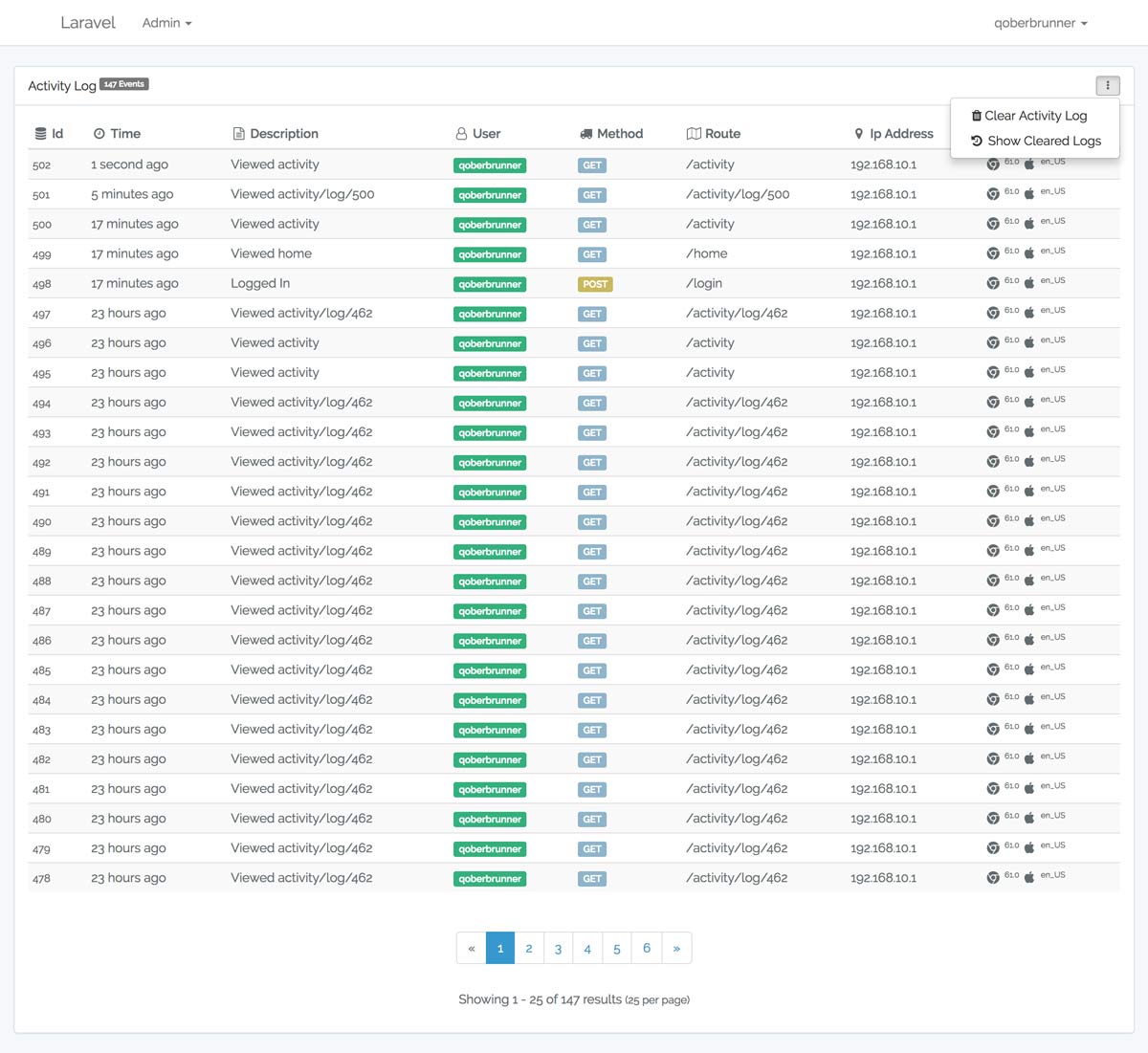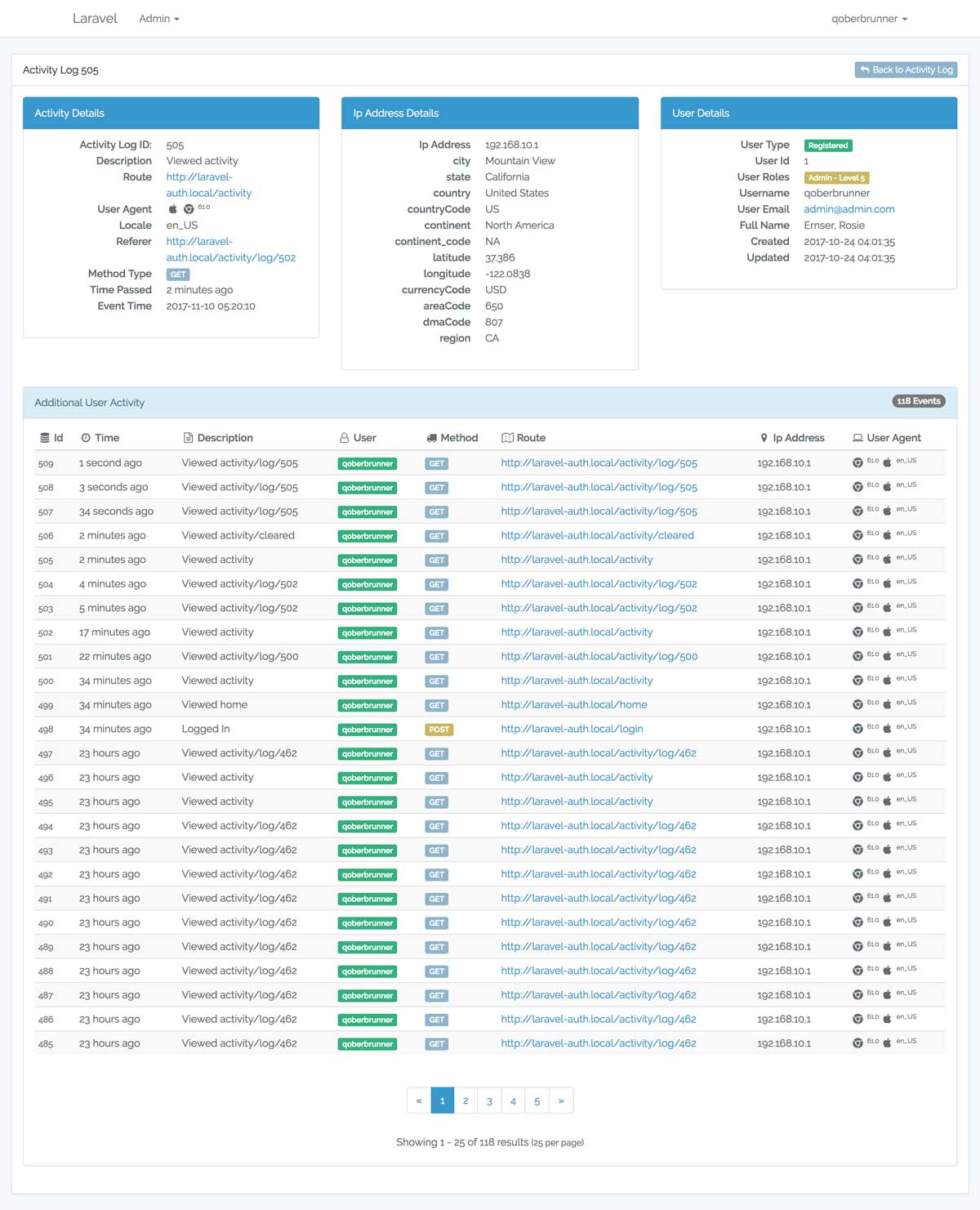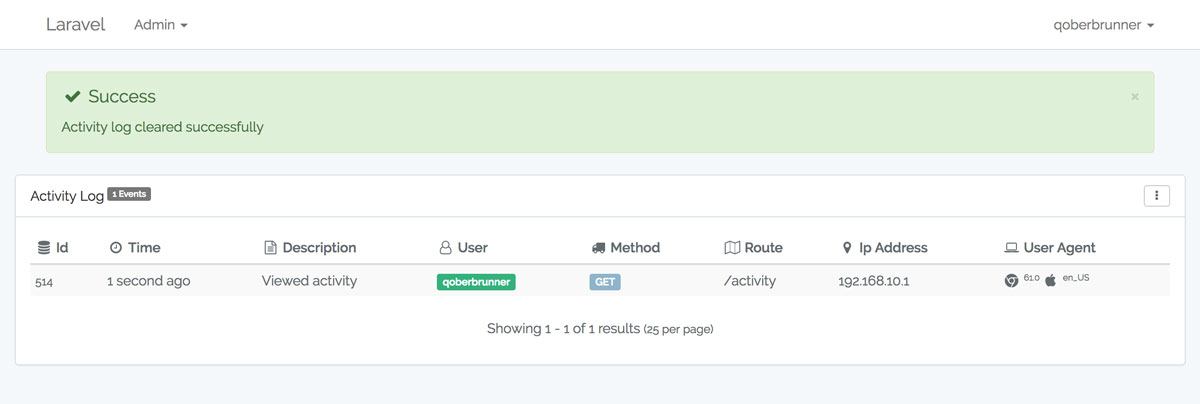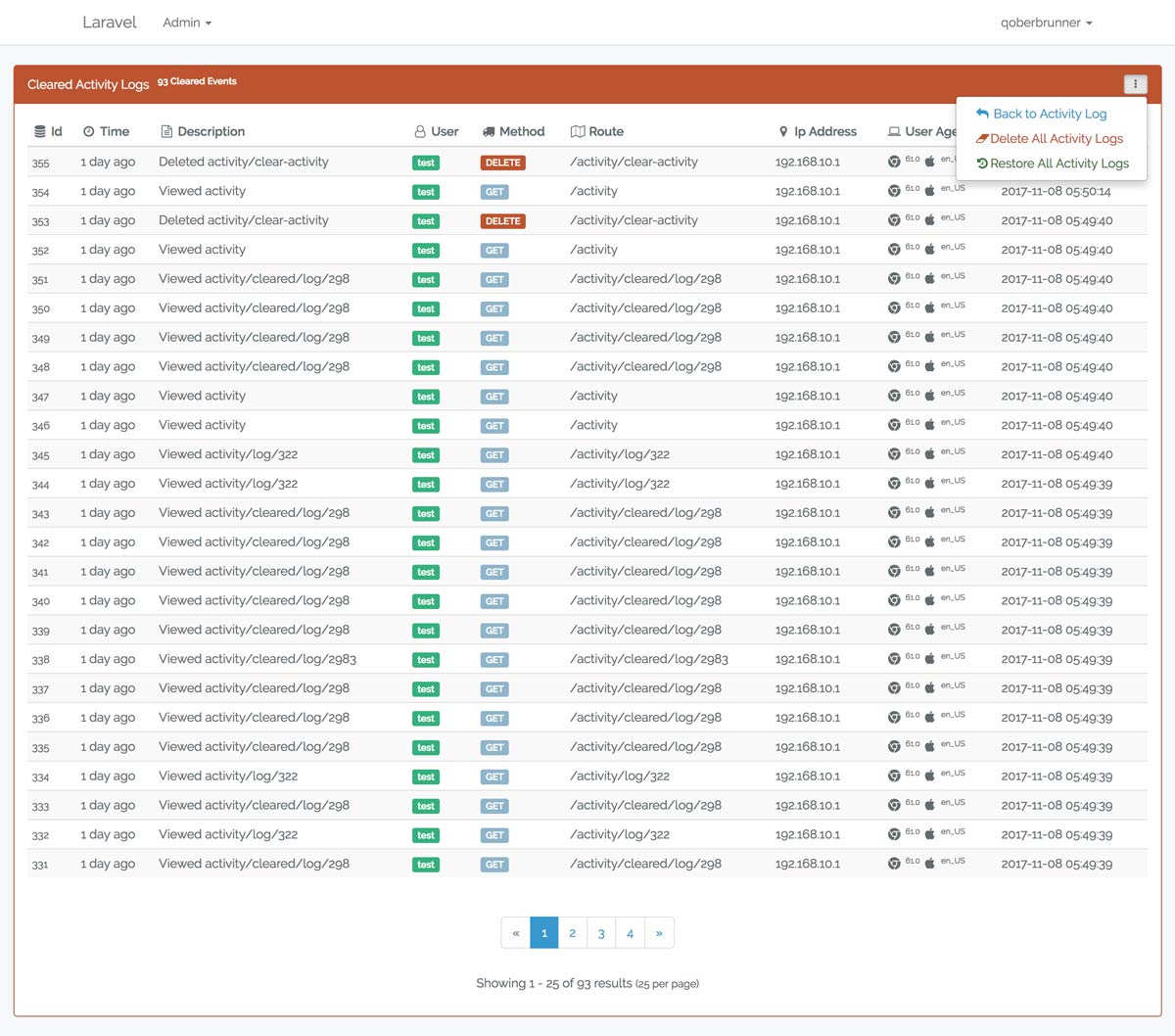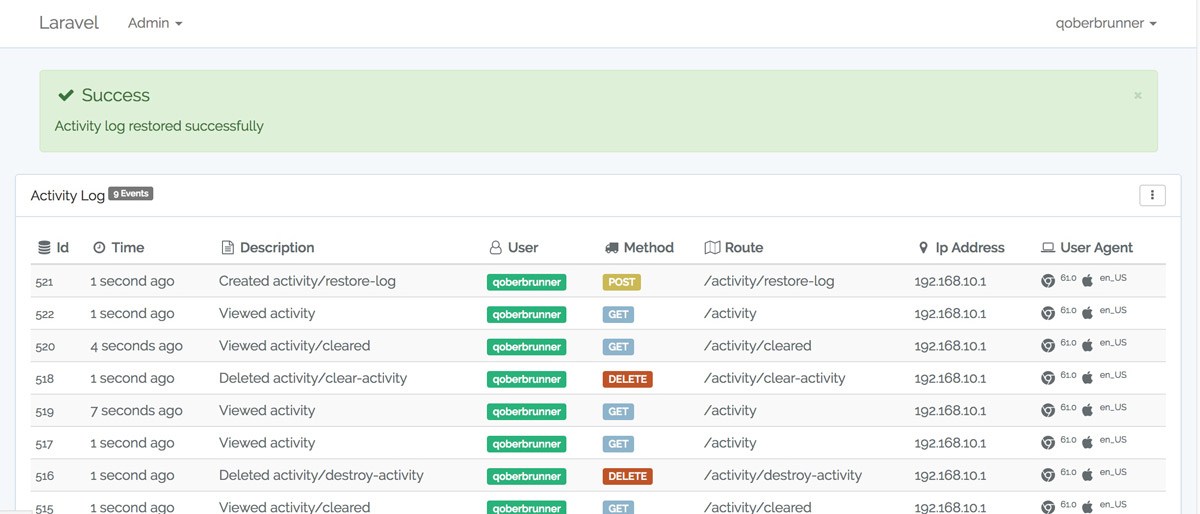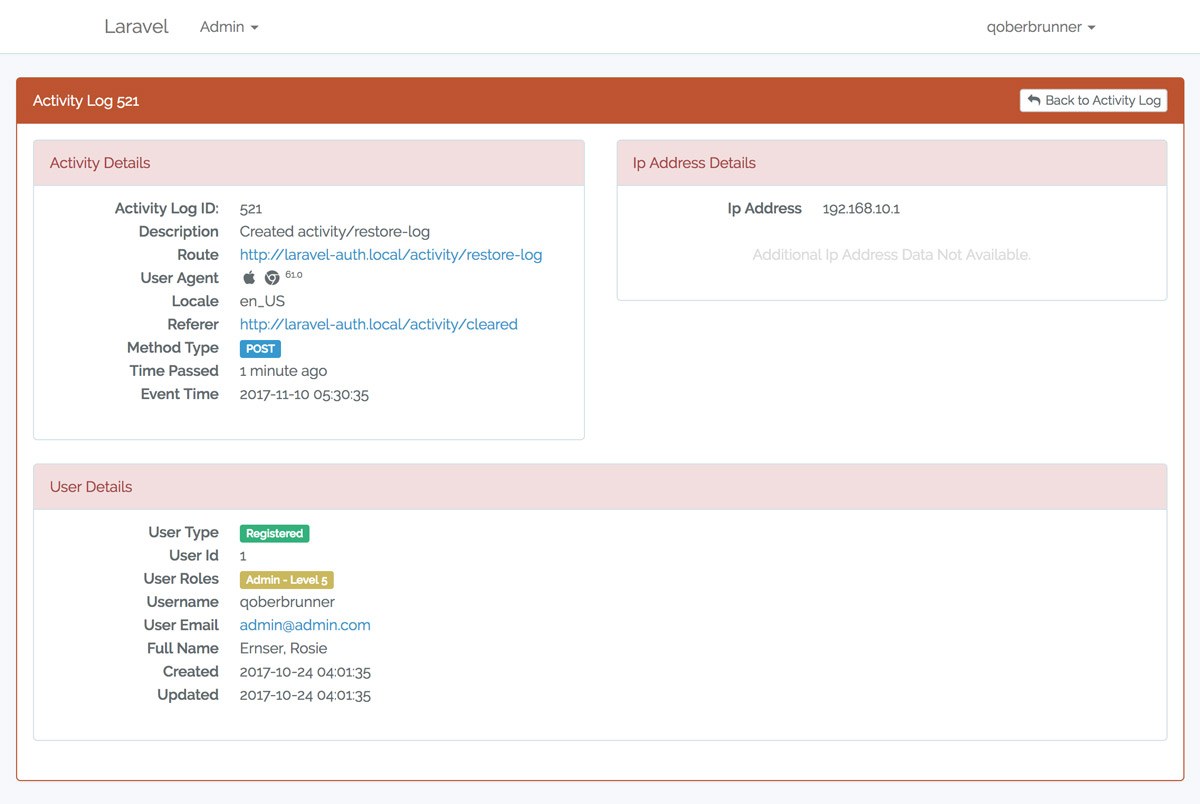Laravel logger is an activity event logger for your Laravel or Lumen application. It comes out the box with ready to use with dashboard to view your activity. Laravel logger can be added as a middleware or called through a trait. Easily have an Activity Log. This package is easily configurable and customizable. Supports Laravel 5.3, 5.4, 5.5, 5.6, 5.7, 5.8, 6, 7, 8 and 9+
- Features
- Requirements
- Integrations
- Laravel Installation Instructions
- Lumen Installation Instructions
- Configuration
- Usage
- Routes
- Search
- Screenshots
- File Tree
- Opening an Issue
- License
| Laravel Activity Logger Features |
|---|
| Logs login page visits |
| Logs user logins |
| Logs user logouts |
| Routing Events can recording using middleware |
| Records activity timestamps |
| Records activity description |
| Records activity details (optional) |
| Records model related to the activity (optional) |
| Records activity user type with crawler detection |
| Records activity Method |
| Records activity Route |
| Records activity Ip Address |
| Records activity User Agent |
| Records activity Browser Language |
| Records activity referrer |
| Customizable activity model |
| Activity panel dashboard |
| Individual activity drilldown report dashboard |
| Activity Drilldown looks up Id Address meta information |
| Activity Drilldown shows user roles if enabled |
| Activity Drilldown shows associated user events |
| Activity log can be cleared, restored, and destroyed using eloquent softdeletes |
| Cleared activity logs can be viewed and have drilldown ability |
| Uses font awesome, cdn assets can be optionally called in configuration |
| Uses Geoplugin API for drilldown IP meta information |
| Uses Language localization files |
| Lots of configuration options |
- Laravel 5.1, 5.2, 5.3, 5.4, 5.5, 5.6, 5.7, 5.8, 6, and 7+
- jaybizzle/laravel-crawler-detect included dependency in composer.json (for crawler detection)
If you'd prefer a more visual review of this package, please watch this video on Laravel Package Tutorial.
Laravel logger can work out the box with or without the following roles packages:
- jeremykenedy/laravel-roles
- spatie/laravel-permission
- Zizaco/entrust
- romanbican/roles
- ultraware/roles
- From your projects root folder in terminal run:
composer require jeremykenedy/laravel-logger- Register the package
-
Laravel 5.5 and up Uses package auto discovery feature, no need to edit the
config/app.phpfile. -
Laravel 5.4 and below Register the package with laravel in
config/app.phpunderproviderswith the following:
'providers' => [
jeremykenedy\LaravelLogger\LaravelLoggerServiceProvider::class,
];- Run the migration to add the table to record the activities to:
php artisan migrate- Note: If you want to specify a different table or connection make sure you update your
.envfile with the needed configuration variables.
-
Optionally Update your
.envfile and associated settings (see Environment File section) -
Optionally publish the packages views, config file, assets, and language files by running the following from your projects root folder:
php artisan vendor:publish --tag=LaravelLogger- From your projects root folder in terminal run:
composer require jeremykenedy/laravel-logger- Register the package
Register the package with laravel in bootstrap/app.php with the following:
$app->register(\Jaybizzle\LaravelCrawlerDetect\LaravelCrawlerDetectServiceProvider::class);
$app->configure('laravel-logger');
$app->register(\jeremykenedy\LaravelLogger\LaravelLoggerServiceProvider::class);
$app->routeMiddleware(['activity' => \jeremykenedy\LaravelLogger\App\Http\Middleware\LogActivity::class, ]);- Copy the configuration file laravel-logger.php to your
config/directory
- Run the migration to add the table to record the activities to:
php artisan migrate- Note: If you want to specify a different table or connection make sure you update your
.envfile with the needed configuration variables.
- Optionally Update your
.envfile and associated settings (see Environment File section)
Laravel Activity Logger can be configured in directly in /config/laravel-logger.php if you published the assets.
Or you can variables to your .env file.
Here are the .env file variables available:
LARAVEL_LOGGER_DATABASE_CONNECTION=mysql
LARAVEL_LOGGER_DATABASE_TABLE=laravel_logger_activity
LARAVEL_LOGGER_ROLES_ENABLED=true
LARAVEL_LOGGER_ROLES_MIDDLWARE=role:admin
LARAVEL_LOGGER_MIDDLEWARE_ENABLED=true
LARAVEL_LOGGER_MIDDLEWARE_EXCEPT=
LARAVEL_LOGGER_ACTIVITY_MODEL=jeremykenedy\LaravelLogger\App\Models\Activity
LARAVEL_LOGGER_USER_MODEL=App\User
LARAVEL_LOGGER_USER_ID_FIELD=id
LARAVEL_LOGGER_DISABLE_ROUTES=false
LARAVEL_LOGGER_PAGINATION_ENABLED=true
LARAVEL_LOGGER_CURSOR_PAGINATION_ENABLED=false
LARAVEL_LOGGER_PAGINATION_PER_PAGE=25
LARAVEL_LOGGER_DATATABLES_ENABLED=true
LARAVEL_LOGGER_ENABLE_SEARCH=true
LARAVEL_LOGGER_SEARCH_FIELDS=description,user,method,route,ip
LARAVEL_LOGGER_DASHBOARD_MENU_ENABLED=true
LARAVEL_LOGGER_DASHBOARD_DRILLABLE=true
LARAVEL_LOGGER_LOG_RECORD_FAILURES_TO_FILE=true
LARAVEL_LOGGER_FLASH_MESSAGE_BLADE_ENABLED=true
LARAVEL_LOGGER_LAYOUT=layouts.app
LARAVEL_LOGGER_BOOTSTRAP_VERSION=4
LARAVEL_LOGGER_BLADE_PLACEMENT=stack #option: yield or stack
LARAVEL_LOGGER_BLADE_PLACEMENT_CSS=css-header #placement name
LARAVEL_LOGGER_BLADE_PLACEMENT_JS=scripts-footer #placement name
LARAVEL_LOGGER_JQUERY_CDN_ENABLED=true
LARAVEL_LOGGER_JQUERY_CDN_URL=https://code.jquery.com/jquery-2.2.4.min.js
LARAVEL_LOGGER_BOOTSTRAP_CSS_CDN_ENABLED=true
LARAVEL_LOGGER_BOOTSTRAP_CSS_CDN_URL=https://maxcdn.bootstrapcdn.com/bootstrap/4.0.0/css/bootstrap.min.css
LARAVEL_LOGGER_BOOTSTRAP_JS_CDN_ENABLED=true
LARAVEL_LOGGER_BOOTSTRAP_JS_CDN_URL=https://maxcdn.bootstrapcdn.com/bootstrap/4.0.0/js/bootstrap.min.js
LARAVEL_LOGGER_POPPER_JS_CDN_ENABLED=true
LARAVEL_LOGGER_POPPER_JS_CDN_URL=https://cdnjs.cloudflare.com/ajax/libs/popper.js/1.12.9/umd/popper.min.js
LARAVEL_LOGGER_FONT_AWESOME_CDN_ENABLED=true
LARAVEL_LOGGER_FONT_AWESOME_CDN_URL=https://maxcdn.bootstrapcdn.com/font-awesome/4.7.0/css/font-awesome.min.cssEvents for laravel authentication scaffolding are listened for as providers and are enabled via middleware. You can add events to your routes and controllers via the middleware:
activityExample to start recording page views using middlware in web.php:
Route::group(['middleware' => ['web', 'activity']], function () {
Route::get('/', 'WelcomeController@welcome')->name('welcome');
});This middlware can be enabled/disabled in the configuration settings.
Events can be recorded directly by using the trait. When using the trait you can customize the event description.
To use the trait:
-
Include the call in the head of your class file:
use jeremykenedy\LaravelLogger\App\Http\Traits\ActivityLogger;
-
Include the trait call in the opening of your class:
use ActivityLogger;
-
You can record the activity by calling the traits method:
ActivityLogger::activity("Logging this activity.");Or as bellow to include extended activity details:
ActivityLogger::activity("Logging this activity.", "Additional activity details.");Or even including the model related to the activity:
ActivityLogger::activity("Logging this activity.", "Additional activity details.", ["id" => 1, "model" => "App\Models\User"]);
/activity/activity/cleared/activity/log/{id}/activity/cleared/log/{id}
If you wish to change the route paths, names or other options you can disable the default routes in your .env file by setting
LARAVEL_LOGGER_DISABLE_ROUTES=trueIf you are on an existing install, you will also need update your laravel-logger.php config file to add the config option:
'disableRoutes' => env('LARAVEL_LOGGER_DISABLE_ROUTES', false),You can then add the routes directly to your application's routes/web.php file, and customise as required.
Route::group(['prefix' => 'activity', 'namespace' => 'jeremykenedy\LaravelLogger\App\Http\Controllers', 'middleware' => ['web', 'auth', 'activity']], function () {
// Dashboards
Route::get('/', 'LaravelLoggerController@showAccessLog')->name('activity');
Route::get('/cleared', ['uses' => 'LaravelLoggerController@showClearedActivityLog'])->name('cleared');
// Drill Downs
Route::get('/log/{id}', 'LaravelLoggerController@showAccessLogEntry');
Route::get('/cleared/log/{id}', 'LaravelLoggerController@showClearedAccessLogEntry');
// Forms
Route::delete('/clear-activity', ['uses' => 'LaravelLoggerController@clearActivityLog'])->name('clear-activity');
Route::delete('/destroy-activity', ['uses' => 'LaravelLoggerController@destroyActivityLog'])->name('destroy-activity');
Route::post('/restore-log', ['uses' => 'LaravelLoggerController@restoreClearedActivityLog'])->name('restore-activity');
});adding dynamic search fields (description , user, URL , method and ip address)
When dealing with millions activity records, default behavior of not paginate records or Laravel's paginator (enabled LARAVEL_LOGGER_PAGINATION_ENABLED=true) may lead to huge performance penalties. For that use case you may set LARAVEL_LOGGER_CURSOR_PAGINATION_ENABLED=true to enable Laravel's Cursor Pagination feature. This will heavily improve Laravel Logger page loading time. If you choose to do so it's advisable to read Cursor vs. Offset Pagination section on Laravel's documentation to get acquainted with Cursor Pagination limitations.
add these configurations to your .env file to control the logging search
LARAVEL_LOGGER_ENABLE_SEARCH=true
// you can customize your search using these options [description,user,method,route,ip]
LARAVEL_LOGGER_SEARCH_FIELDS=description,user,method,route,ip
by default all search fields are enabled when you enable the search with this one line configuration
LARAVEL_LOGGER_SEARCH_ENABLE=true
├── .env.travis
├── .gitignore
├── .travis.yml
├── CODE_OF_CONDUCT.md
├── LICENSE
├── README.md
├── composer.json
└── src
├── .env.example
├── LaravelLoggerServiceProvider.php
├── app
│ ├── Http
│ │ ├── Controllers
│ │ │ └── LaravelLoggerController.php
│ │ ├── Middleware
│ │ │ └── LogActivity.php
│ │ └── Traits
│ │ ├── ActivityLogger.php
│ │ ├── IpAddressDetails.php
│ │ └── UserAgentDetails.php
│ ├── Listeners
│ │ ├── LogAuthenticated.php
│ │ ├── LogAuthenticationAttempt.php
│ │ ├── LogFailedLogin.php
│ │ ├── LogLockout.php
│ │ ├── LogPasswordReset.php
│ │ ├── LogSuccessfulLogin.php
│ │ └── LogSuccessfulLogout.php
│ ├── Logic
│ │ └── helpers.php
│ └── Models
│ └── Activity.php
├── config
│ └── laravel-logger.php
├── database
│ └── migrations
│ └── 2017_11_04_103444_create_laravel_logger_activity_table.php
├── resources
│ ├── lang
│ │ ├── de
│ │ │ └── laravel-logger.php
│ │ └── en
│ │ └── laravel-logger.php
│ └── views
│ ├── forms
│ │ ├── clear-activity-log.blade.php
│ │ ├── delete-activity-log.blade.php
│ │ └── restore-activity-log.blade.php
│ ├── logger
│ │ ├── activity-log-cleared.blade.php
│ │ ├── activity-log-item.blade.php
│ │ ├── activity-log.blade.php
│ │ └── partials
│ │ └── activity-table.blade.php
│ ├── modals
│ │ └── confirm-modal.blade.php
│ ├── partials
│ │ ├── form-search.blade.php
│ │ ├── form-status.blade.php
│ │ ├── scripts.blade.php
│ │ └── styles.blade.php
│ └── scripts
│ ├── add-title-attribute.blade.php
│ ├── clickable-row.blade.php
│ ├── confirm-modal.blade.php
│ ├── datatables.blade.php
│ └── tooltip.blade.php
└── routes
└── web.php- Tree command can be installed using brew:
brew install tree - File tree generated using command
tree -a -I '.git|node_modules|vendor|storage|tests'
Before opening an issue there are a couple of considerations:
- You are all awesome!
- Read the instructions and make sure all steps were followed correctly.
- Check that the issue is not specific to your development environment setup.
- Provide duplication steps.
- Attempt to look into the issue, and if you have a solution, make a pull request.
- Show that you have made an attempt to look into the issue.
- Check to see if the issue you are reporting is a duplicate of a previous reported issue.
- Following these instructions show me that you have tried.
- If you have a questions send me an email to [email protected]
- Need some help, I can do my best on Slack: https://opensourcehelpgroup.slack.com
- Please be considerate that this is an open source project that I provide to the community for FREE when opening an issue.
Laravel-logger is licensed under the MIT license. Enjoy!




